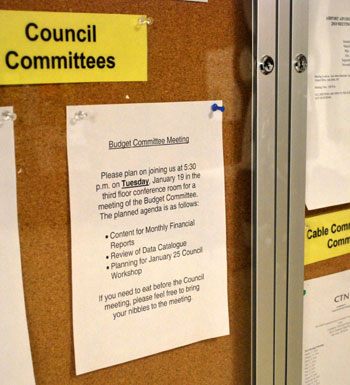Ann Arbor Budget Process Starts Up
A short meeting of the Ann Arbor city council’s budget committee – just before the full council’s Jan. 22 session – resulted in a consensus on an approach to budget planning for the next two-year cycle.

The Ann Arbor city council is beginning a budget planning process that should culminate in a council vote to adopt a fiscal year 2014 budget at its second meeting in May, which falls this year on May 20, 2013.
City administrator Steve Powers and chief financial officer Tom Crawford sketched out three kinds of topics they could explore with the full council at work sessions through the spring: (1) funding for items in the capital improvements plan (CIP); (2) budget impact analysis, broken down by service unit; and (3) additional resources required to support the city council’s five priority areas, which were identified in a planning session late last year.
The top three priority areas are: (1) city budget and fiscal discipline; (2) public safety; and (3) infrastructure. Two additional areas were drawn from a raft of other possible issues as those to which the council wanted to devote time and energy over the next two years: (4) economic development; and (5) affordable housing.
Possible city council work session dates are the second and fourth Mondays of the month. Regular meetings fall on the first and third Mondays.
The city council will be adopting a final budget for fiscal year 2014 by its second meeting in May. FY 2014 starts on July 1, 2013. Although the council approves an annual budget for the next fiscal year, the city uses a two-year planning cycle. This year starts a new two-year cycle, the first complete one for city administrator Steve Powers, who started the job about a year and a half ago, in September of 2011.
During some back-and-forth with the budget committee about the staff’s ability to provide all the information to the council that the committee had been describing – within the timeframe of the budget season – Powers joked: “Tom and I aren’t rookies!” Powers was previously Marquette County administrator for 16 years. Crawford has served as Ann Arbor’s CFO for more than eight years.
The council’s five-member budget committee consists of: Sabra Briere (Ward 1), Jane Lumm (Ward 2), Christopher Taylor (Ward 3), Marcia Higgins (Ward 4) and Mike Anglin (Ward 5).
An interesting wrinkle that emerged during the budget committee’s discussion was the role to be played by the city council in shaping the capital improvements plan (CIP). In response to some interest expressed by committee members to amend the CIP, Powers encouraged them to think in terms of allocating funds (or not) for elements of the plan. That’s because the content of the CIP is the statutory responsibility of the planning commission, not of the city council. The city council’s role is to determine which projects should be funded, Powers explained. But it’s for the city planning commission to finalize the content of the CIP itself.
This report includes more on the Michigan Planning Enabling Act (Act 33 of 2008) and the city council’s recent history of amending the CIP. [Full Story]




